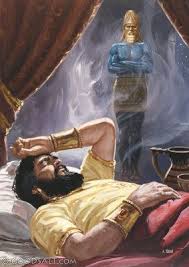Nebuchadnezzar’s Troubling Dream
Dani’el 2: 1-49
601 BC during the eleven-year reign of Jehoiakim

Soon after Nebuchadnezzar’s accession to the throne in he was plagued with a recurring dream. Since Dani’el’s recalled and interpreted only a single dream (Dani’el 2:24-26), the use of the plural in this section (dreams) seems to indicate a recurrence of the same dream. Nebuchadnezzar evidently perceived this dream as having great significance, for he was troubled by the dream, and was so agitated that he was unable to sleep.
As we read Dani’el 2, the Joseph narrative, which closely parallels this chapter, comes quickly to mind (see the commentary on Genesis, to see link click Jq – Joseph Before Pharaoh). In Genesis a pagan king, the Egyptian Pharaoh, had a deeply troubling dream concerning seven lean and seven fat cows. When the wise men of Egypt could not interpret the dream for him, his cupbearer (paralleling the role of Arioch in Dani’el 2:14-16) helps him discover one who could interpret his dream, who turned out to be the imprisoned Joseph. Through the help of ADONAI, Yosef revealed the interpretation of the dream to the pharaoh, resulting in his rise in status in the court of Egypt.
Consequently, we see that Dani’el is like Joseph, perhaps even better than Yosef, since he not only interpreted the dream but, with the help of YHVH, actually tells the contents of the dream to the Babylonian king. Both Yosef and Dani’el serve as models for godly behavior to God’s people who live in a foreign culture.
Here, in the chapter, we see Dani’el as a model of Israelite wisdom (verse 14) and a model of Israelite piety, in his prayer (verse 18), his wisdom (verse 19), his praise (verses 19-23), his witness (verses 27-28), his self-effacement (verse 30), and his conviction (verse 45). The fruit of his work is not merely rewards and promotion (verse 48), but obedience and recognition of his God (verses 46-47).228
The LORD’s knowledge of the future is particularly important to the people in exile and under some measure of oppression because it implies that He controls history. This reminds us of the overall theme of the book: In spite of present circumstances, God is in control.
A (2:1-13) So the king summoned the magi, enchanters, sorcerers and astrologers to tell him what he had dreamed (Dani’el 2:2a).
B (2:14-16) When Arioch, the chief of the executioners, had gone out to put to death the magi, Dani’el spoke to him with wisdom and tact (2:14).
C (2:17-23) During the night the mystery was revealed to Dani’el in a vision. Then Dani’el praised the God of heaven (Dani’el 2:19).
B (2:24) Then Dani’el went to Arioch, saying, “Do not execute the magi. Take me to the king, and I will interpret his dream for him (2:24)”
A (2:25-49) No magi, enchanter or magician can explain to the king the mystery he has asked about, but there is a God in heaven who reveals mysteries (2:27).



Leave A Comment